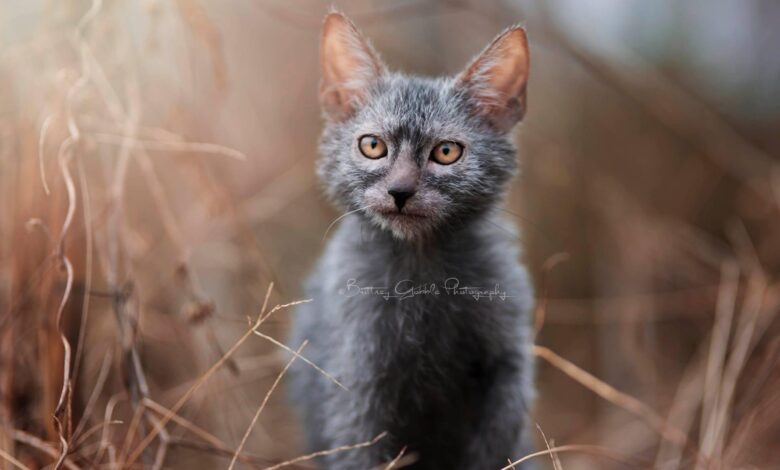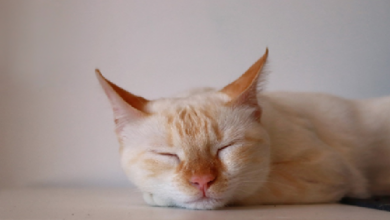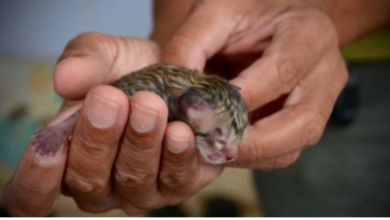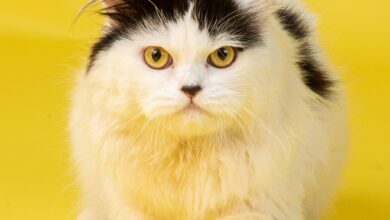The Lykoi Cat-The Werewolf Cat

What is it? Where did it come from? Why does it look that way?
The Lykoi cat, also known as the “Werewolf cat,” is a relatively new and rare breed of cat that has a unique appearance. The name “Lykoi” comes from the Greek word for wolf, which is fitting since the breed’s appearance is reminiscent of a werewolf.
The Lykoi cat was first discovered in 2011 by breeders Johnny Gobble, Brittney Gobble, and Patti Thomas in a feral colony in Tennessee, USA. The cat’s distinct appearance caught their attention, and they decided to breed them to create the Lykoi breed. The breed was first recognized by The International Cat Association (TICA) in 2017.
The Lykoi cat has a sparse, patchy coat that resembles the fur of a werewolf or a Sphynx cat. They have no fur around their eyes, nose, and mouth, which makes their eyes appear more prominent. Their fur is also unique in that it sheds very little, so they require minimal grooming.
The Lykoi breed is not genetically related to the Sphynx or any other hairless breeds, and they are not genetically linked to any breed of wild cat. Their unique appearance is believed to be the result of a naturally occurring genetic mutation that causes their fur to be sparse and patchy.
Despite their eerie appearance, Lykoi cats are friendly, affectionate, and intelligent cats. They are also known to be playful and active, making them a great choice for families with children or other pets. However, because they are a relatively new and rare breed, they can be quite expensive and difficult to find.
Development Of The Breed Lykoi
Initially, the breeders believed that the cats had a disease or genetic mutation that caused their unusual appearance. However, after extensive testing, it was found that the Lykoi cat’s appearance is a result of a natural genetic mutation. The breeders decided to breed the cats with the unique appearance to create the Lykoi breed.
The breeding program started with two cats, a male and a female, and the breeders worked to introduce new genetic diversity to the population. They crossed the Lykoi cats with black domestic shorthair cats and black domestic shorthair cats with a Devon Rex-type coat to develop a diverse gene pool.
The breeders also worked with veterinary geneticists to ensure that the breeding program was responsible and ethical. They performed extensive genetic testing to ensure that the breed’s health and genetic diversity were maintained.
In 2017, The International Cat Association (TICA) recognized the Lykoi as a new breed. The breed standard requires the cats to have a unique patchy coat, no hair around the eyes, nose, and mouth, and a friendly and outgoing personality.
The Lykoi cat is still a rare breed, and the breeding program continues to be closely monitored to ensure that the breed remains healthy and genetically diverse. The breeders also work to educate the public about the breed’s unique appearance and personality to ensure that the cats find suitable and loving homes.
How Affordable Is Pet Insurance For Cats?
The cost of pet insurance for cats can vary widely depending on several factors, such as the cat’s breed, age, and overall health, as well as the level of coverage you choose. Generally speaking, pet insurance premiums are more affordable when the cat is younger and in good health.
On average, pet insurance for cats can range from $20 to $50 per month, although some policies can cost more or less depending on the coverage level and other factors. Basic policies typically cover accidents and illnesses, while more comprehensive plans may also cover routine check-ups, vaccinations, and other preventative care.
It’s important to note that while pet insurance can help cover unexpected veterinary expenses, it may not cover all costs, and you may still be responsible for paying deductibles, co-pays, and other fees. Additionally, some policies may exclude certain pre-existing conditions or breed-specific health issues. Before choosing a pet insurance policy, it’s important to carefully review the terms and conditions of the policy, including any exclusions or limitations. You may also want to shop around and compare policies from different providers to find the one that best fits your cat’s needs and your budget
Insurance Providers
There are many insurance providers that offer pet insurance for cats, each with their own unique policies, coverage options, and pricing. Some of the most popular cat insurance providers include:
Healthy Paws: This provider offers comprehensive coverage for accidents and illnesses, including hereditary and congenital conditions. They also have no annual or lifetime coverage limits, and offer fast reimbursement and direct payment to veterinary clinics.
Petplan: Petplan offers coverage for accidents and illnesses, as well as hereditary and chronic conditions. They also offer customizable policies with different deductibles, reimbursement levels, and coverage limits.
Trupanion: Trupanion offers a simple, comprehensive policy that covers 90% of veterinary costs related to accidents and illnesses. They also offer direct payment to veterinary clinics and have no payout limits.
Embrace: Embrace offers coverage for accidents and illnesses, as well as optional coverage for routine care. They also offer customizable policies with different deductible options and reimbursement levels.
Nationwide: Nationwide offers coverage for accidents and illnesses, as well as coverage for routine care and wellness exams. They also offer a range of policy options with different deductible and reimbursement options.
When choosing an insurance provider for your cat, it is important to research and compare different policies to find the best coverage for your cat’s needs and your budget. It is also important to read the fine print and understand any exclusions or limitations that may apply to the policy.
Best Pet Insurance
The “best” pet insurance provider for you and your cat will depend on a number of factors, including your budget, your cat’s health history, and the level of coverage you require. However, some of the top-rated pet insurance providers in the industry include:
Healthy Paws: Healthy Paws is a popular choice among pet owners due to its comprehensive coverage for accidents, illnesses, and hereditary conditions. They offer unlimited lifetime coverage with no caps or limits, and they reimburse vet bills quickly and directly.
Petplan: Petplan is another well-regarded pet insurance provider, offering customizable policies with varying deductibles, reimbursement levels, and coverage limits. Their policies cover accidents, illnesses, hereditary conditions, and alternative therapies.
Trupanion: Trupanion offers a simple and straightforward policy that covers 90% of veterinary costs related to accidents and illnesses. They have no payout limits or caps, and they offer direct payment to veterinary clinics.
Embrace: Embrace offers customizable policies that cover accidents, illnesses, and optional coverage for routine care. They offer a range of deductible options, and they provide coverage for hereditary conditions and alternative therapies.
Nationwide: Nationwide is the largest pet insurance provider in the US, offering coverage for accidents, illnesses, and routine care. Their policies are customizable, and they offer optional coverage for hereditary conditions and alternative therapies.
When choosing a pet insurance provider, it is important to research and compare policies to find the best coverage for your cat’s needs and your budget. Be sure to read the fine print and understand any exclusions or limitations that may apply to the policy.











